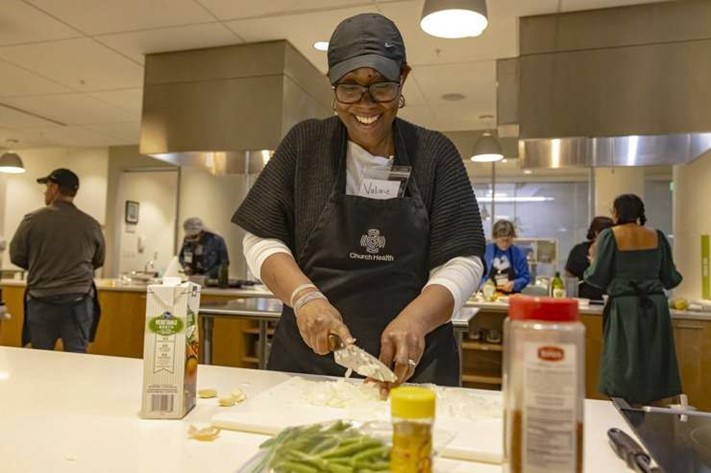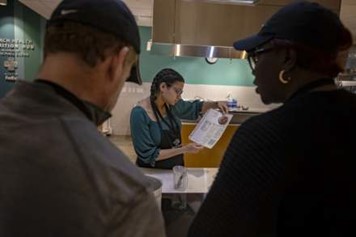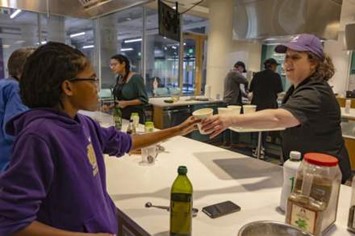Cheryl StevensManning traveled on average 42 weeks a year in her job as a workshop training facilitator, leaving little time to develop culinary skills.
Luckily, her husband was a good cook.
“Walt was a phenomenal salmon cooker,” StevensManning, 65, recalls of her late husband, Walter Manning, the associate dean in the school of communication sciences and disorders at the University of Memphis. He retired in 2016 and died last September following complications from Alzheimer’s disease.
“That’s mostly what we ate, a lot of sh and not much meat.”
So among the considerations for StevensManning as she began pondering her new reality after her husband’s death and her own retirement was one particular detail seemingly unimportant in the grand scheme and yet entirely necessary: how to feed herself.
That’s how she and the Church Health Cook Well, Be Well program became acquainted.
“Someone in my family came across this cooking class, and so I signed up,” StevensManning said. “Unfortunately, I didn’t make the rst cut because the class was full, and so I made the next one (in February).”

Cook Well, Be Well is a four-class series, meeting for two hours once a week for four weeks, at the Church Health Nutrition Hub in Crosstown Concourse. The nutrition hub is part of the Church Health suite of services. Church Health occupies the first, second and third doors of Concourse’s west atrium with a medical clinic, dental clinic, eye clinic and physical therapy services in addition to the nutrition hub, which boasts a full kitchen with multiple ovens and stove tops as well as a community dining room.
Sharon Moore, the wellness education and nutrition manager, said Cook Well, Be Well grew out of the nutrition hub’s original mission to serve as a licensing facility for the culinary medicine curriculum at the Goldring Center for Culinary Medicine at Tulane University in New Orleans.
they began to expand offerings into Church Health’s Memphis community, Moore said nutritionists started to realize that more basic skills were needed than what was being taught as part of the licensing curriculum.
“What we found, for the population we serve, is that these classes were a little too advanced and we needed to have more cooking skills in the curriculum,” Moore said.

As a result, participants who sign up for the free, four-week Cook Well, Be Well sessions now get the basic kitchen skills that many novice chefs need — how to handle knives properly, knowing the difference between simmering and sauteing, Figuring out when to slice and when to dice.
“You’re not going to cook anything, healthy or otherwise, if you don’t know how to cook,” noted Sheri McKelvie, a nutrition coordinator who helped write the curriculum for the classes and develop the recipes prepared by participants.
Gabriella Huffstetler, another nutrition coordinator, said knowing there’s a watchful eye is reassuring for beginning chefs.
“I think one of the biggest things is that they like having somebody walk you through cooking,” she said. “It kind of takes away a bit of the fear and builds their condence.”
At the end of each class session, participants gather in the community dining room to share a meal of everything made in that day’s class.

Among the recipes prepared during the hands-on sessions are a range of dishes based on the principles of the Mediterranean diet; it places a heavy emphasis on vegetables, fruits, whole grains, beans, nuts and seeds, olive oil, and herbs and spices for seasoning. Meat is used sparingly, though some recipes do include chicken.
The diet derives its name from the traditional flavors and cooking methods of people in the Mediterranean region. Repeated studies have shown fewer
deaths from cardiovascular disease as well as lower blood pressure and cholesterol among people in Mediterranean countries such as Greece and Italy.
Mason said it’s no accident that Church Health focuses on the Mediterranean style of cooking in its courses.
“A lot of the people we serve are obese, have diabetes, hypertension or all of the above,” she said. “We knew that was the right thing for us to be teaching where we live in Memphis, Tennessee.”
The nutrition team began developing the curriculum and recipes for its community classes during the pandemic, when they could not bring people together in the kitchen, and then launched the classes post-pandemic.